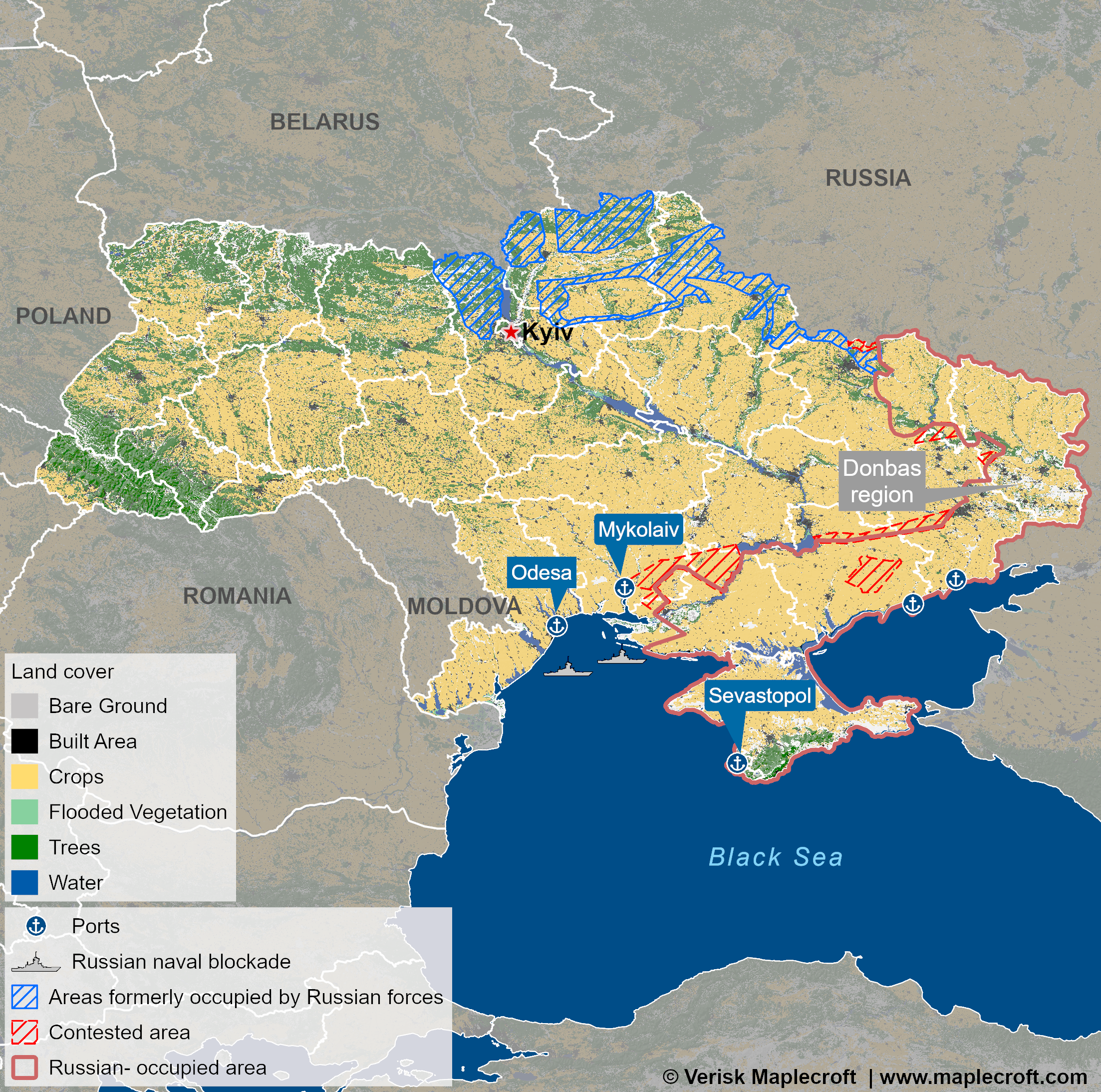Geospatial ESG investing
Learn more
Food as a weapon
On the back of the pandemic, over 70% of the countries tracked by our Food Import Security Index (139 of 194) have seen an increase in risk since 2020-Q1.
And with Russia now accused of using global demand for Ukraine’s ‘breadbasket’ as a geopolitical bargaining tool, we expect a further negative shift in 2022-Q3, with a high risk of a spillover effect into civil and political instability in regions from Africa to Asia.
The FAO’s benchmark Cereal Price Index was running at 30% year on year in May. But with the Russian ambassador walking out of a 6 June UNSC meeting, after being accused by European Council President Charles Michel of using food as a ‘stealth missile’ against developing countries, diplomatic efforts to open up a Black Sea corridor for Ukrainian grain exports don’t seem to be making much headway, meaning little salvation for global cereal prices.
According to our analysts Ophelia Coutts and Hamish Kinnear, worse is yet to come, with the conflict preventing much of Ukraine’s 2022/23 harvest from reaching global markets.
The Kremlin is demanding that Western sanctions are scaled back before it allows access to Black Sea ports, and to date efforts brokered by Turkey and the UN secretary-general António Guterres to negotiate a humanitarian corridor for grains has not progressed.
Pre-war, around 90% of Ukraine’s grain was exported via Black Sea via ports including Chornomorsk, Mykolaiv, Odesa, Kherson and Yuzhny. Efforts to divert additional exports via land/rail have proven difficult logistically, and woefully inadequate compared to the volumes typically shipped via the Black Sea.
Given this situation, the country is also running out of domestic grain storage. Ukraine’s total grains storage capacity is 75 million tonnes. Yet with some of this capacity located in the conflict zone, the available volume is more like 61 million tonnes, and 35% of this capacity has already been taken up by the 2021 harvest.
If grain silos cannot be emptied, a logistical nightmare is guaranteed once the harvest season for several key crops starts in July.
There have also been reports of Russia stealing Ukrainian cereal and selling it on the black market. In some locations, Russian troops have burned supplies, so in addition to the physical blockade of Black Sea ports, Ukrainian grain is being destroyed.
On 5 June, Oleksandr Kubrakov, Ukraine’s infrastructure minister, warned that Russia’s actions risked creating famine “on a global scale”. A prospect also spelled out to President Vladimir Putin by the head of the African Union, Macky Sall, who simultaneously told Putin at talks in Sochi that Africans were also victims of the conflict.
For the global agricultural market, a ‘good’ scenario for 2022 was broad continuity of supply despite the Russia-Ukraine crisis. Though given the market distortions in place post-pandemic, prices were already under pressure, driving inflation in virtually all countries. In March, the FAO’s benchmark global Food Price Index had already reached its highest level since its inception in 1990.
A ‘bad’ scenario involved steep production declines, export/licence bans, protracted supply bottlenecks, and elevated price pressures across all commodities, including wheat, maize, soya beans, sugar cane and coffee, cascading down into second-tier products such as biofuels, meat production, and processed foods.
Unfortunately, the ‘bad’ scenario is fast materialising.
According to the FAO, as of 6 June, 20 countries had imposed food and/or fertiliser export bans affecting 34 products, with export licences and/or export taxes also in place in seven countries, affecting nine products. Affected products range from grains, sugar, flour and oils to poultry and meat, live cattle, and an array of fruit and vegetables.
Combined, these measures are affecting 10.6% of the global calorie market, on FAO calculations.
If the first half of 2022 was sombre, the second half looks no brighter.
Eileen Gavin
Principal Analyst, Global Markets & Americas
ESG+ Matters notification
SubscribeChart of the week
Quote of the week
He’s toast.
Anna Soubry
UK Conservative MP Anna Soubry comments on PM Boris Johnson, who emerged badly burned from a party confidence vote, 7 June 2022.
What we’re reading
- Russia Is Down. But It’s Not Out, New York Times, 2 June 2022
- Things are about to get even worse for Boris Johnson, The Spectator, 7 June 2022
- How ESG investing came to a reckoning, FT Big Read, 6 June 2022
- China Shifting Focus to Southeast Asia, Sri Lanka President Says, Bloomberg Politics, 7 June 2022
- The pandemic has accelerated a global decline in the rule of law, The Economist, 7 June 2022
- Bahamas eyes blue bond with IADB guarantee, Global Capital, 7 June 2022
- Asset managers and banks scramble to avoid Texas divestment, Responsible Investor, 7 June 2022
- EU supervisors publish SFDR clarification, Environmental Finance, 7 June 2022
- With climate change lurking, China’s food security dream seems a bridge too far, S&P Global, Commodity Insights, 7 June 2022
